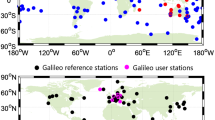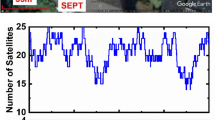Abstract
The performance of high-precision Global Navigation Satellite System (GNSS) positioning in multi-frequency and multi-constellation environments strongly depends on the understanding and handling the biases that inevitably exist between the different systems and signals. The usage of observable-specific signal bias (OSB), allowing to map biases to each individual observation type involved, provides full flexibility for the multi-GNSS bias processing. In this contribution, the OSB estimation model is extended from the traditional dual-frequency model to multi-frequency and multi-GNSS one to provide GPS/GLONASS triple-frequency, Galileo five-frequency, BDS six-frequency phase/code bias products for precise point positioning (PPP) ambiguity resolution (AR). Results indicate that the code bias products exhibit high stability with average standard deviations (STDs) of 0.06–0.10 ns for GPS and 0.16–0.33 ns for BDS/Galileo/GLONASS. Likewise, the daily phase bias is extremely stable, with average STDs of 0.01–0.02 ns for GPS and Galileo, 0.03–0.05 ns for BDS and 0.05–0.07 ns for GLONASS. Particularly, for the modernized binary offset carrier signals of Galileo E5 and BDS-3 B2, their phase/code biases present relatively high consistency between the different tracking modes and different frequencies. In addition, obvious differences in the range of 10.92–28.58 ns can be noted between the receiver-specific code bias of BDS-2 and BDS-3 for their common frequency signals. Based on the observable-specific phase and code biases, a multi-frequency PPP cascade integer resolution model is developed to make full use of all available observations from different GNSSs. After applying these bias products, PPP AR with GPS, BDS, Galileo and GLONASS multi-frequency observations is achieved with an average convergence time of 4.44 min, showing remarkable improvements of 56.8% and 16.8% compared to dual-frequency PPP float and fixed solutions, respectively.

















Similar content being viewed by others
Data availability
The GNSS observations are available in the IGS repository: ftp://cddis.gsfc.nasa.gov/pub/gps/data/campaign/mgex/daily/rinex3. Our OSB products are now available on the website of the International GNSS Monitoring & Assessment System (iGMAS) Innovation Center at the School of Geodesy and Geomatics, Wuhan University (http://igmas.users.sgg.whu.edu.cn/products/download/directory/products/osb).
References
Banville S, Geng J, Loyer S, Schaer S, Springer T, Strasser S (2020) On the interoperability of IGS products for precise point positioning with ambiguity resolution. J Geod. https://doi.org/10.1007/s00190-019-01335-w
Deng Y, Guo F, Ren X, Ma F, Zhang X (2021) Estimation and analysis of multi-GNSS observable-specific code biases. GPS Solut. https://doi.org/10.1007/s10291-021-01139-6
Geng J, Bock Y (2013) Triple-frequency GPS precise point positioning with rapid ambiguity resolution. J Geod 87(5):449–460
Geng J, Chen X, Pan Y, Zhao Q (2019) A modified phase clock/bias model to improve PPP ambiguity resolution at Wuhan University. J Geod 93(10):2053–206
Li X, Li X, Yuan Y, Zhang K, Zhang X, Wickert J (2018) Multi-GNSS phase delay estimation and PPP ambiguity resolution: GPS, BDS, GLONASS. Galileo. J Geod 92(6):579–608
Li X, Li X, Liu G, Feng G, Yuan Y, Zhang K, Ren X (2019) Triple-frequency PPP ambiguity resolution with multi-constellation GNSS: BDS and Galileo. J Geod 93(8):1105–1122
Li X, Li X, Liu G, Xie W, Feng G (2020) The phase and code biases of Galileo and BDS-3 BOC signals: effect on ambiguity resolution and precise positioning. J Geod. https://doi.org/10.1007/s00190-019-01336-9
Li X, Li X, Huang J, Shen Z, Wang B, Yuan Y, Zhang K (2021) Improving PPP-RTK in urban environment by tightly coupled integration of GNSS and INS. J Geod. https://doi.org/10.1007/s00190-021-01578-6
Liu Y, Song W, Lou Y, Ye S, Zhang R (2017) GLONASS phase bias estimation and its PPP ambiguity resolution using homogeneous receivers. GPS Solut 21(2):427–437
Liu T, Zhang B, Yuan Y, Li Z, Wang N (2019) Multi-GNSS triple-frequency differential code bias (DCB) determination with precise point positioning (PPP). J Geod 93(5):765–784
Liu C, Yao Z, Wang D, Gao W, Liu T, Rao Y, Li D, Su C (2022) Multiplexing modulation design optimization and quality evaluation of BDS-3 PPP service signal. Satell Navig 3(1):1–13
Montenbruck O, Hauschild A (2013) Code biases in multi-GNSS point positioning. Proc. ION ITM. Institute of Navigation. San Diego, California, USA, pp 616–628
Montenbruck O et al (2017) The multi-GNSS experiment (MGEX) of the international GNSS service (IGS) - achievements, prospects and challenges. Adv Space Res 59(7):1671–1697
Odijk D, Zhang B, Khodabandeh A, Odolinski R, Teunissen PJG (2016) On the estimability of parameters in undifferenced, uncombined GNSS network and PPP-RTK user models by means of S-system theory. J Geod 90(1):15–44
Pan L, Zhang X, Li X, Liu J, Li X (2017) Characteristics of inter-frequency clock bias for Block IIF satellites and its effect on triple-frequency GPS precise point positioning. GPS Solut 21(2):811–822
Ren X, Chen J, Li X, Zhang X (2021) Ionospheric total electron content estimation using GNSS carrier phase observations based on zero-difference integer ambiguity: methodology and assessment. IEEE Trans Geosci Remote Sens 59(1):1–14
RTCM-SC (2016) RTCM standard 10403.3 differential GNSS (Global Navigation Satellite System) Services—Version 3. RTCM Special Committee 104, Oct 7, 2016.
Schaer S, Villiger A, Arnold D, Dach R, Prange L, Jäggi A (2021) The code ambiguity-fixed clock and phase bias analysis products: generation, properties, and performance. J Geod 95(7):1–25
Teunissen PJG (1995) The least-squares ambiguity decorrelation adjustment: a method for fast GPS integer ambiguity estimation. J Geod 70(1–2):65–82
Teunissen PJG, Joosten P, Tiberius C (1999) Geometry-free ambiguity success rates in case of partial fixing. Proc. ION ITM. Institute of Navigation. San Diego, California, USA, pp 201–207
Villiger A, Schaer S, Dach R, Prange L, Sušnik A, Jäggi A (2019) Determination of GNSS pseudo-absolute code biases and their long-term combination. J Geod 93(9):1487–1500
Wang N, Li Z, Duan B, Hugentobler U, Wang L (2020) GPS and GLONASS observable-specific code bias estimation: comparison of solutions from the IGS and MGEX networks. J Geod. https://doi.org/10.1007/s00190-020-01404-5
Wang J, Zhang Q, Huang G (2021) Estimation of fractional cycle bias for GPS/BDS-2/Galileo based on international GNSS monitoring and assessment system observations using the uncombined PPP model. Satell Navig 2(1):11
Wanninger L, Beer S (2015) BeiDou satellite-induced code pseudorange variations: diagnosis and therapy. GPS Solut 19(4):639–648
Zhang X, Xie W, Ren X, Li X, Zhang K, Jiang W (2017) Influence of the GLONASS inter-frequency bias on differential code bias estimation and ionospheric modeling. GPS Solut 21(3):1355–1367
Zhang B, Liu T, Yuan Y (2018) GPS receiver phase biases estimable in PPP-RTK networks: dynamic characterization and impact analysis. J Geod 92(6):659–674
Zhao Q, Guo J, Liu S, Tao J, Hu Z, Chen G (2021) A variant of raw observation approach for BDS/GNSS precise point positioning with fast integer ambiguity resolution. Satell Navig 2:29. https://doi.org/10.1186/s43020-021-00059-7
Acknowledgments
This study is financially supported by the National Natural Science Foundation of China (No. 41974027), the National Key Research and Development Program of China (2021YFB2501102) and the Sino-German mobility program (Grant No. M-0054).
Author information
Authors and Affiliations
Corresponding author
Additional information
Publisher's Note
Springer Nature remains neutral with regard to jurisdictional claims in published maps and institutional affiliations.
Rights and permissions
About this article
Cite this article
Li, X., Li, X., Jiang, Z. et al. A unified model of GNSS phase/code bias calibration for PPP ambiguity resolution with GPS, BDS, Galileo and GLONASS multi-frequency observations. GPS Solut 26, 84 (2022). https://doi.org/10.1007/s10291-022-01269-5
Received:
Accepted:
Published:
DOI: https://doi.org/10.1007/s10291-022-01269-5




